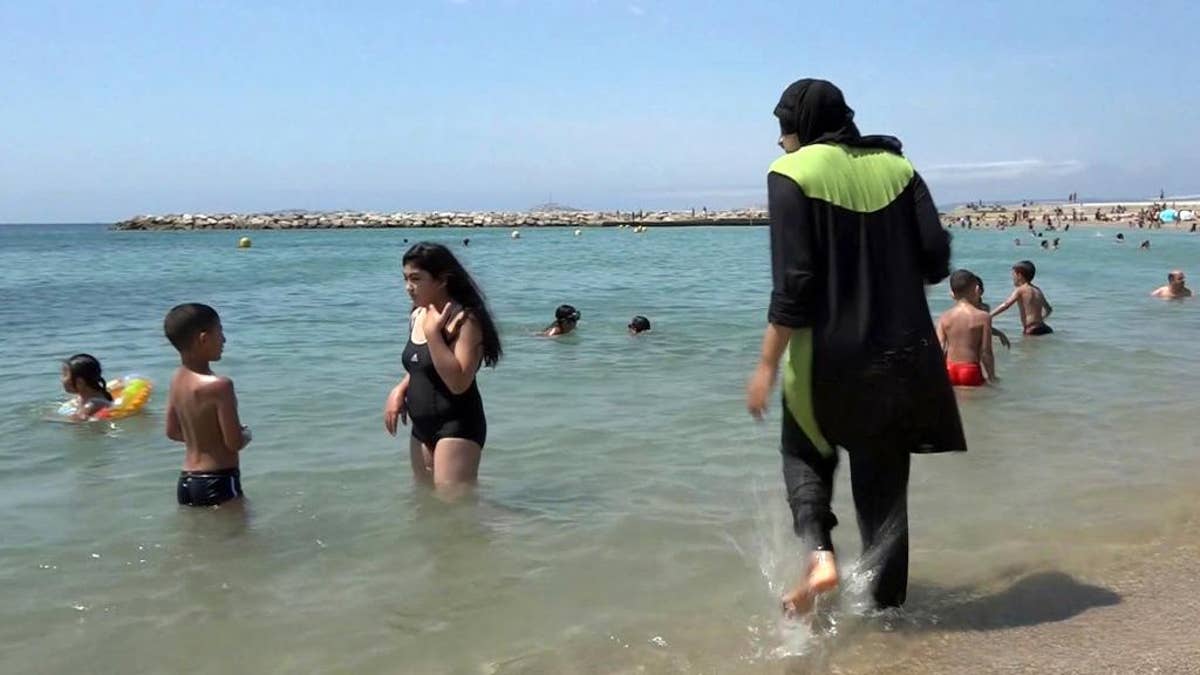This week a set of photos went viral capturing side-by-side glimpses of a burkini-clad Muslim woman surrounded by officers who then forced her to remove her burkini. The burkini is a swim-suit adaptation named after the most monstrous Islamist garment called a burqa.
I’m a conservative, an American, and a Muslim reformer. As a Muslim woman I was disappointed on Friday to see the France’s highest court overturn the burkini ban. For a liberal society, the decision means the protection of free expression. For watchdogs like myself who look to the horizon, we know this sets a second precedent: the acceptance of Islamist culture. Friday there were two wins: the first for a tolerant society and the second for Islamists waging a soft civilization jihad.
The creator of the burkini, Australian-Lebanese designer Aheda Zanetti, said the burkini was designed to give women more freedom. However, these freedoms are taken away from women through oppressive garments such as the burkini. We saw the same thing with hijabs. Hijabs were once an option and now the only Muslim women represented in the media are hijabis. In other words, what Muslim women are being told – and shamed with – is that if you’re not covered, you’re not Muslim or modest. It’s a soft form of slut-shaming that surprisingly few feminists have caught onto. One day it’s hijabistas and the next day it’s burkinis, but the message is the same: cover up.
The burkini is a new adaptation of that. Though unintended by the designer, the consequences are the same: if you’re not covered, you’re inappropriate. And that’s what the underbelly of Islamic culture does: it aims to control a woman’s space, whether it is in the mosque, in the bedroom, in the home, her body, or her voice. It’s an abusive cultural conditioning.

FILE - In this Aug. 4 2016 file photo made from video, Nissrine Samali, 20, gets into the sea wearing a burkini, a wetsuit-like garment that also covers the head, in Marseille, southern France. (AP)
The burkini conversation is the latest champion of civilization jihad. A term pulled directly from the Islamist doctrine of the Muslim Brotherhood, civilization jihad looks to conquer and impose “Islamic” views on non-Islamic states using the system (and the culture) against itself. That culture is tolerance, and Islamists ride that wave. This week that wave crashed upon the beaches of France, a cultural war zone not that different from the Invasion of Normandy.
Supporting the burkini isn’t just about modesty, it’s about a symbolic garment that piggy backs off the burqa – and the burqa is a totem of feminist oppression. As a conservative woman and a Muslim Reformer, support for the burkini that doesn’t look deeper than just “let them wear what they want,” is damaging to our efforts to foster critical thinking within the Muslim world.
This is about a faith that has been hijacked by extremism and is viciously adapting. Accepting the burkini is no different than accepting the burqa. If Muslim women want to dress conservatively at the beach of course they can. However, for many Muslim women token garments like the hijab and the burkini are nothing more than expressions of identity. But Islam and faith is something you carry in your heart; it isn’t something you wear. And that’s where it needs to stay – in our hearts rather than branded on our bodies.









































